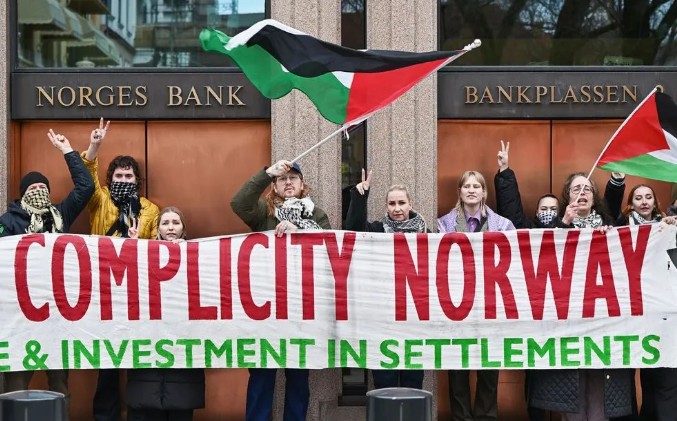As Norway approaches its pivotal September parliamentary elections, the country is not just choosing a government it’s defining its moral compass. At the center of this reckoning is Norway’s $2 trillion sovereign wealth fund, which has taken bold steps to divest from companies allegedly complicit in human rights violations in Gaza. Among those affected is Caterpillar Inc., the American machinery giant now facing a perfect storm of ethical scrutiny and economic headwinds. The fallout has triggered diplomatic tensions, corporate recalibrations, and fierce political backlash from Washington.
Norway’s Political Crossroads: Ethics vs. Energy
Norway’s elections are shaping up to be one of the most consequential in recent memory. Prime Minister Jonas Gahr Støre’s Labour Party is locked in a tight race with the Conservatives and the right-wing Progress Party. But beyond traditional issues like taxation and healthcare, a new axis of debate has emerged: ethical investing and foreign policy accountability.
Sovereign Wealth Fund Under Fire
The Government Pension Fund Global the world’s largest sovereign wealth fund has long been a model of transparency and ethical oversight. But its recent decision to divest from several Israeli banks and U.S. defense contractors has ignited controversy. The fund cited concerns over complicity in violations of international law in Gaza, referencing reports from the UN and human rights organizations.
This move has drawn praise from progressive parties like the Socialist Left, which argue that Norway must not profit from war crimes. However, Labour has pushed back, warning that politicizing the fund could undermine its long-term financial stability and global credibility.
Caterpillar’s Tariff Crisis: A Breakdown of the $1.8 Billion Blow
Caterpillar Inc., one of the world’s largest manufacturers of construction and mining equipment, is facing a massive financial hit from U.S. tariffs a burden that’s compounding its reputational challenges following Norway’s divestment.
Tariff Breakdown and Supply Chain Impact
Caterpillar has revised its 2025 tariff-related cost estimate to $1.5 billion–$1.8 billion, up from earlier projections of $1.3 billion–$1.5 billion. This increase stems from:
- Section 232 tariffs on steel and aluminum, which affect Caterpillar’s core components.
- Expanded levies on imports from key trading partners including Canada, the EU, Japan, India, and Southeast Asia.
- Third-quarter costs alone are expected to reach $500 million–$600 million, a sharp rise from previous forecasts.
These tariffs have disrupted Caterpillar’s supply chain, particularly in sourcing sensors, hydraulic systems, and precision electronics. While the company is attempting to localize production and dual-source components, the pace of mitigation has lagged behind the cost escalation.
Margin Compression and Strategic Response
The financial toll is significant:
- Construction Industries segment saw a 29% decline in operating profit.
- Resource Industries (mining) dropped 25%, largely due to pricing pressures and tariff costs.
- Caterpillar’s adjusted operating profit margin is now expected to land at the bottom of its target range, despite stable revenue projections.
To counteract these pressures, Caterpillar is:
- Cutting discretionary spending.
- Reengineering supply chains to comply with USMCA rules.
- Accelerating its automation strategy, including autonomous mining trucks that moved 7.5 billion metric tons by 2023.
Despite these efforts, analysts warn that tariff headwinds are rising faster than mitigation strategies, and the company may face another $1.1 billion in tariff costs in 2026.
The Gaza Conflict and Corporate Accountability
Norway’s divestment decisions were informed by a UN report naming 48 companies allegedly complicit in what Special Rapporteur Francesca Albanese called an “economy of genocide.” These companies span defense, tech, logistics, and finance.
Key Companies Implicated
| Company | Country | Alleged Role in Gaza Conflict |
| Lockheed Martin | United States | Supplies F-35 jets used in airstrikes |
| Leonardo S.p.A. | Italy | Provides weapons systems |
| FANUC Corporation | Japan | Robotics for weapons production |
| Microsoft | United States | Cloud services used in surveillance |
| Alphabet (Google) | United States | Data processing for permit regime |
| Amazon | United States | Hosts surveillance data via AWS |
| Atlas Air | United States | Transports military cargo to Israeli bases |
| BAE Systems | United Kingdom | Components for Israeli fighter jets |
| Barclays | United Kingdom | Finances arms manufacturers |
| Allianz | Germany | Invested nearly $1B in Israeli bonds post-Oct 7 |
These companies deny wrongdoing, but the reputational risks are mounting as institutional investors reevaluate their portfolios.
Lindsey Graham’s Fury: Diplomatic Retaliation and Rhetorical Fire
U.S. Senator Lindsey Graham responded to Norway’s divestment with unprecedented hostility, threatening economic and diplomatic retaliation.
Graham’s Threats
- Called the move “beyond offensive” and warned it “will not go unanswered”.
- Proposed tariffs on Norwegian goods and visa bans for fund managers.
- Declared: “Doing business or visiting America is a privilege, not a right.”
Prime Minister Jonas Gahr Støre attempted to de-escalate tensions, clarifying that the fund operates independently of the government.
Comments on Gaza
Graham’s rhetoric extended to Israel’s military campaign:
- Compared it to World War II, citing Hiroshima and Nagasaki as “the right decision”.
- Urged the U.S. to “give Israel the bombs they need to end the war”.
- Suggested Israel should “take Gaza by force and start over again,” likening it to post-war Berlin and Tokyo.
These remarks have drawn condemnation from human rights groups, diplomats, and even fellow lawmakers, who argue that such statements undermine peace efforts and normalize disproportionate violence.
The Global Stakes: Ethics, Economics, and the New Investment Paradigm
Norway’s sovereign wealth fund is more than a financial juggernaut it’s a moral bellwether. Its decisions influence trillions in global capital, and its stance on Gaza could set a precedent for ethical investing worldwide.
For Caterpillar, the challenge is balancing innovation and profitability with reputational risk and geopolitical volatility. For U.S. lawmakers like Graham, the issue is sovereignty and loyalty. And for voters in Norway, the question is whether their country should lead with conscience or caution.
Conclusion: Norway’s Election as a Compass for Ethical Capital
The outcome of Norway’s upcoming election won’t just determine who governs it may redefine how nations wield their values in the global marketplace. As the world’s largest sovereign wealth fund takes a stand on human rights and corporate accountability, Norway is signaling that ethical investing is no longer a niche philosophy it’s a geopolitical force.
If the electorate backs parties that support divestment from companies linked to human rights violations, it will send a clear message: national values can and should shape financial strategy. This could embolden other countries especially those with large public pension funds or state-owned investment vehicles to follow suit.
We may see:
- Institutional investors reevaluating portfolios through a moral lens.
- Governments introducing legislation that ties foreign investment to human rights benchmarks.
- Multinational corporations facing increased pressure to align operations with global ethical standards or risk losing access to capital.
Norway’s decision to divest from Caterpillar and Israeli banks is already reverberating across boardrooms and parliaments. If replicated, it could mark the beginning of a new era where profit is no longer pursued at the expense of principle.
In short, this election could be the tipping point where values become currency, and where ethical leadership becomes a competitive advantage on the world stage.

